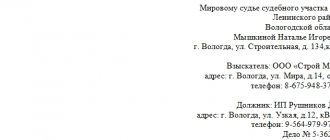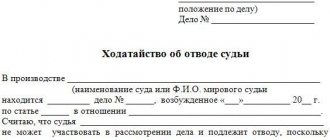New edition of Art. 330 Code of Civil Procedure of the Russian Federation
1. The grounds for canceling or changing a court decision on appeal are:
1) incorrect determination of circumstances relevant to the case;
2) failure to prove the circumstances relevant to the case established by the court of first instance;
3) discrepancy between the conclusions of the court of first instance, set out in the court decision, and the circumstances of the case;
4) violation or incorrect application of substantive law or procedural law.
2. Incorrect application of substantive law is:
1) non-application of the law to be applied;
2) application of a law that is not subject to application;
3) misinterpretation of the law.
3. Violation or incorrect application of procedural law is grounds for changing or canceling the decision of the court of first instance, if this violation led or could lead to the adoption of an incorrect decision.
4. The grounds for canceling the decision of the court of first instance in any case are:
1) consideration of the case by a court with an illegal composition;
2) consideration of the case in the absence of any of the persons participating in the case and not properly notified of the time and place of the court hearing;
3) violation of the rules on the language in which judicial proceedings are conducted;
4) the court makes a decision on the rights and obligations of persons not involved in the case;
5) the court decision was not signed by the judge or any of the judges, or the court decision was signed by the wrong judge or judges who were part of the court that considered the case;
6) the absence of a written protocol of the court session in the case or its signing by persons other than those specified in Article 230 of this Code, in the absence of an audio or video recording of the court session;
7) violation of the rule on the secrecy of the meeting of judges when making a decision.
5. If there are grounds provided for in part four of this article, the appellate court considers the case according to the rules of proceedings in the court of first instance without taking into account the specifics provided for in this chapter. On the transition to consideration of the case according to the rules of procedure in the court of first instance, a ruling is issued indicating the actions that must be performed by the persons participating in the case and the time frame for their completion.
6. A decision of the court of first instance that is essentially correct cannot be canceled for formal reasons alone.
Additional commentary on Article 330 of the Code of Civil Procedure of the Russian Federation
Provisions similar in content to the provisions of the commented article 330 of the Code of Civil Procedure of the Russian Federation in the previous edition were contained in the chapter “Proceedings in the court of cassation” of the Code of Civil Procedure of the Russian Federation and related to the production of judicial acts that have not entered into legal force. Currently, the issues of proceedings in the court of cassation are devoted to Chapter. 41 (see commentary to this chapter).
Clause 1 of Part 1 of the commented Article 330 of the Code of Civil Procedure of the Russian Federation stipulates that incorrect determination of circumstances relevant to the case is grounds for canceling or changing a court decision on appeal. It should be noted that the party (plaintiff), exercising its right to judicial protection, determines the subject (substantive legal requirement for the defendant to perform certain actions or refrain from them, to recognize the existence (absence) of a legal relationship, to change or terminate it) and the grounds for the stated claims (factual circumstances referred to by the plaintiff in support of the stated claim).
At the same time, the court determines what circumstances are important for the case, which party (plaintiff or defendant) must prove them, and brings up the circumstances for discussion, even if the parties did not refer to any of them (see commentary to Art. Code of Civil Procedure of the Russian Federation) . Therefore, in each specific case, the court, based precisely on the subject and grounds of the stated claims, without collecting evidence <1>, determines the subject of proof in the case under consideration.
It should also be pointed out that, as a rule, incorrect determination of the circumstances relevant to the case entails a violation of the rules of procedural law and incorrect application of the rules of substantive law.
In paragraph 2 of part 1 of the commented article 330 of the Code of Civil Procedure of the Russian Federation, it is provided that the failure to prove circumstances relevant to the case established by the court of first instance is grounds for canceling or changing the court decision on appeal.
In paragraph 3 of part 1 of the commented article 330 of the Code of Civil Procedure of the Russian Federation, it is provided that the discrepancy between the conclusions of the court of first instance, set out in the court decision, and the circumstances of the case is grounds for canceling or changing the court decision on appeal. The court's conclusions set out in the court decision must correspond to the circumstances of the case and be based on a comprehensive, complete, objective and direct examination of the evidence presented by the parties. A legal assessment of the evidence must be given by the court in accordance with the requirements of Art. Code of Civil Procedure of the Russian Federation, as well as with the norms of substantive law governing controversial legal relations. Otherwise, by virtue of the rules of the norm in question, violation of these provisions entails the cancellation of the decision.
Clause 4 of Part 1 of the commented Article 330 of the Code of Civil Procedure of the Russian Federation provides that violation or incorrect application of substantive or procedural law is grounds for canceling or changing a court decision on appeal. Moreover, this provision is disclosed in other parts of the commented norm. Thus, Part 2 of this article establishes that the incorrect application of substantive law is:
- failure to apply the law to be applied;
- application of a law that is not subject to application;
- misinterpretation of the law.
In part 3 of the commented article 330 of the Code of Civil Procedure of the Russian Federation, the legislator established that violation or incorrect application of procedural law, which could lead to the adoption of an incorrect decision, is grounds for changing or canceling this decision.
| Appeal against the decision of the magistrate |
Contest period
Article number 237 of the Code of Civil Procedure of the Russian Federation indicates specific deadlines during which an application for cancellation of a court decision in absentia can be filed.
The final order must be sent to the defendant. He is given a week to collect documentation and write an application to cancel the Civil Procedure Code. The period begins to count from the moment the person receives the notification.
If the defendant does not appeal the decision, then a thirty-day period begins. At this time, all interested parties may file an appeal.
Unconditional grounds for canceling a decision in Article 330 of the Code of Civil Procedure of the Russian Federation
Part 4 of the commented article establishes unconditional grounds for canceling a court decision, i.e. such grounds, which in any case are the basis for canceling the decision, regardless of the arguments of the complaint.
Thus, this norm is aimed at correcting significant violations of procedural law committed by lower courts that influenced the outcome of the case, violating the fundamental principles of civil procedure, without eliminating which it is impossible to restore and protect violated rights, freedoms and legitimate interests, as well as protect public interests protected by law . It is necessary to point out that the legislator has established an exhaustive list of such grounds.
For example, in accordance with Part 2 of Art. The Code of Civil Procedure of the Russian Federation explains and ensures the right of persons participating in the case and not speaking the language in which civil proceedings are conducted to give explanations, conclusions, speak, file petitions, file complaints in their native language or in any freely chosen language of communication, as well as use the services of an interpreter (see comment to this article).
Thus, if, when making a decision by the court, a significant violation of the rules of procedural law is committed, namely if the case is considered in the absence of an interpreter, and a person participating in the case and who does not speak the language in which civil proceedings are conducted will be deprived of the opportunity to give explanations , speak in the debate and justify the factual circumstances of the case in their native language, then this will be an unconditional basis for the reversal of the court decision.
The resolution by the court of the issue(s) about the rights and obligations of persons who were not involved in the case and thereby deprived of the opportunity to actively participate in the civil process and influence its course and development is also an unconditional basis for the reversal of the court decision.
When commenting on this rule of law, it is also necessary to refer to the provisions of Part 1 of Art. 47 of the Constitution of the Russian Federation, in accordance with which no one can be deprived of the right to have his case considered in that court and by the judge to whose jurisdiction it is assigned by law, as well as Resolution of the Constitutional Court of the Russian Federation of April 21, 2010 N 10-P. Taking into account the above and based on the systematic interpretation of the provisions of the Code of Civil Procedure of the Russian Federation, we can come to the conclusion that the consideration by the court of a case in violation of the rules of jurisdiction, taking into account the provisions of Part 1 of Art. 47 of the Constitution of the Russian Federation, indicates that the case was considered by the court in an illegal composition and is an absolute basis for the cancellation of this decision in accordance with clause 1, part 4 of the commented article.
In part 5 of the commented article 330 of the Code of Civil Procedure of the Russian Federation, the legislator established a rule according to which, if the court of appeal cancels the decision on unconditional grounds (established in part 4 of the same article), the court of appeal considers the case according to the rules of proceedings in the court of first instance without taking into account features provided for in Ch. 39 “Proceedings in the court of appeal.”
For example, it seems that when a decision of the court of first instance is canceled in accordance with paragraph 1 of Part 4 of the commented article as adopted in violation of the rules of jurisdiction, Art. 328 of the Code of Civil Procedure of the Russian Federation (“Powers of the court of appeal”), and the provisions of clause 3, part 2, art. , according to which the court transfers the case to another court if, during the consideration of the case in this court, it turns out that it was accepted for proceedings in violation of the rules of jurisdiction.
The Constitutional Court of the Russian Federation has repeatedly indicated in its rulings that the legal provision in question, according to which a court decision that is essentially correct cannot be canceled for formal reasons alone, cannot in itself be considered as violating the constitutional rights and freedoms of persons appealing the said decision, since the determination of which violations are formal and do not entail the cancellation of the verified judicial act of the lower court is subject to determination by the court in each specific case based on the actual circumstances.
It should be noted that if the court decision correctly establishes the circumstances that are important for the case, correctly interprets and applies the rules of substantive law, the court does not commit violations of the rules of procedural law, which, by virtue of the provisions of the commented article, are grounds for canceling the decision, then the clerical errors in the decision and obvious arithmetic errors can be corrected in accordance with Art. 200 of the Code of Civil Procedure of the Russian Federation (see commentary to this article) and such a decision cannot be canceled for formal reasons alone.
Drawing up a complaint against the decision of the arbitration court
When drawing up a complaint to cancel an arbitration court decision, it is important not to make mistakes.
The structure of the procedural document consists of:
- introductory part - name of the court, details of the applicant, details of the defendant, subject of the dispute, amount of state duty paid,
- descriptive part - details of the process, all circumstances related to the dispute,
- reasoning part - grounds for canceling the decision of the arbitration court with reference to regulatory legal acts,
- the operative part - demands, requests to the servants of Themis, as well as a list of documents and signature.
By law, the applicant has a duty to inform about the start of the appeal procedure. You can notify them:
- By sending a registered letter.
- Personal delivery of a package of documents against signature.
The following documents must be attached to the complaint:
- copy of the decision,
- confirmation of payment of state duty or documents on deferment, reduction of payment,
- supporting documents on notification of other participants in the process,
- documents confirming authority (power of attorney, etc.).
Documents can be submitted through “My Arbitrator”, subject to the presence of an enhanced electronic digital signature.
Judicial practice to Article 330 of the Code of Civil Procedure of the Russian Federation
Resolution of the Plenum of the Supreme Court of the Russian Federation dated June 19, 2012 N 13 “On the application by courts of the norms of civil procedural legislation governing proceedings in the court of appeal” on Art. 330 Code of Civil Procedure of the Russian Federation
21. At the same time, the restrictions provided for in Part 4 of Article 327.1 of the Code of Civil Procedure of the Russian Federation do not apply to cases when the appellate court, in accordance with Parts 4 and 5 of Article 330 of the Code of Civil Procedure of the Russian Federation, proceeds to consider the case according to the rules of proceedings in the court of first instance without taking into account the peculiarities provided for by Chapter 39 of the Code of Civil Procedure of the Russian Federation.
22. At the same time, the restrictions provided for in Part 6 of Article 327 of the Code of Civil Procedure of the Russian Federation do not apply to cases when the appellate court, in accordance with Parts 4 and 5 of Article 330 of the Code of Civil Procedure of the Russian Federation, proceeds to consider the case according to the rules of proceedings in the court of first instance without taking into account the peculiarities provided for by Chapter 39 of the Code of Civil Procedure of the Russian Federation.
25. Regardless of the arguments contained in the appeal, presentation, the appellate court, when considering the case, should check the presence of unconditional grounds provided for in Part 4 of Article 330 of the Code of Civil Procedure of the Russian Federation for canceling the court decision of the first instance court, as well as grounds for terminating the proceedings (Article 220 of the Code of Civil Procedure of the Russian Federation) or leaving the application without consideration (paragraphs two to six of Article 222 of the Code of Civil Procedure of the Russian Federation).
29. If the court of first instance incorrectly determined the circumstances that are important for the case (clause 1 of part 1 of Article 330 of the Code of Civil Procedure of the Russian Federation), then the appellate court should raise for discussion the issue of the persons participating in the case presenting additional (new) evidence and, if necessary, at their request, assist them in collecting and requesting such evidence.
The appellate court should also invite the persons participating in the case to present additional (new) evidence if the circumstances relevant to the case have not been proven in the court of first instance (clause 2 of part 1 of Article 330 of the Code of Civil Procedure of the Russian Federation), including due to incorrect distribution obligations of proof (part 2 of article RF Civil Procedure Code).
32. The appellate court, when establishing at a court hearing the unconditional grounds provided for in Part 4 of Article 330 of the Code of Civil Procedure of the Russian Federation for canceling the court decision of the court of first instance on the basis of Part 5 of Article 330 of the Code of Civil Procedure of the Russian Federation, issues a reasoned ruling on the transition to consideration of the case according to the rules of proceedings in the court of first instance without taking into account the features provided for by Chapter 39 of the Code of Civil Procedure of the Russian Federation, which does not cancel the appealed court decision of the court of first instance. At the same time, the determination to proceed to consideration of the case according to the rules of proceedings in the court of first instance without taking into account the features provided for in Chapter 39 of the Code of Civil Procedure of the Russian Federation is not subject to appeal.
35. In the event that the appellate court, on the basis of Part 5 of Article 330 of the Code of Civil Procedure of the Russian Federation, proceeds to consider the case according to the rules of proceedings in the court of first instance without taking into account the features provided for in Chapter 39 of the Code of Civil Procedure of the Russian Federation, the case must be considered within the time limits specified in Article 327.2 of the Code of Civil Procedure of the Russian Federation. The time period for consideration of the case in the appellate court cannot be extended.
36. It should be borne in mind that if the court of appeal, based on the results of consideration of the appeal, cancels the decision of the court of first instance on the grounds provided for in Part 1 of Article 330 of the Code of Civil Procedure of the Russian Federation, in accordance with the provisions of Article 328 of the Code of Civil Procedure of the Russian Federation, the case is sent for a new trial to the court the first instance is not allowed. In this case, the appellate court itself makes a new decision on the case.
If violations of the norms of procedural law specified in Part 4 of Article 330 of the Code of Civil Procedure of the Russian Federation are established, the appellate court, on the basis of Part 5 of Article 330 of the Code of Civil Procedure of the Russian Federation, proceeds to consider the case according to the rules of proceedings in the court of first instance, without taking into account the specifics provided for in Chapter 39 of the Code of Civil Procedure of the Russian Federation.
When applying the provisions of paragraph 1 of part 4 of Article 330 of the Code of Civil Procedure of the Russian Federation, appellate courts must take into account that the case is considered to have been considered by a court with an illegal composition in the case where, for example, the case was considered by a person not vested with the powers of a judge; the judge was subject to challenge on the grounds provided for in paragraphs 1, 2 of part 1 and part 2 of the article of the Code of Civil Procedure of the Russian Federation; the judge repeatedly participated in the consideration of the case in violation of the provisions of the article of the Code of Civil Procedure of the Russian Federation.
37. Violation by the court of first instance of the rules of procedural law establishing the rules of jurisdiction is not a basis for the appellate court to apply paragraph 1 of part 4 of article 330 of the Code of Civil Procedure of the Russian Federation.
If there are these violations, the appellate court, in accordance with Article 47 of the Constitution of the Russian Federation and Part 2 of Article of the Code of Civil Procedure of the Russian Federation, cancels the decision of the court of first instance on the grounds of Part 3 of Article 330 of the Code of Civil Procedure of the Russian Federation and transfers the case to the court of first instance, which has jurisdiction over its consideration by law.
38. If the court of appeal comes to the conclusion that the decision taken by the court of first instance at the preliminary court hearing (paragraph two of part 6 of Article 152 of the Code of Civil Procedure of the Russian Federation) to refuse to satisfy the claim (application) due to missing the limitation period or missing the established federal the law of the period for applying to the court is illegal and (or) unfounded, then it, on the basis of Part 1 of Article 330 and Article 328 of the Code of Civil Procedure of the Russian Federation, cancels the decision of the court of first instance. In such a situation, taking into account the provisions of paragraph two of part 1 of Article 327 of the Code of Civil Procedure of the Russian Federation on the re-examination of the case by the court of appeal, it is subject to referral to the court of first instance for its consideration on the merits of the stated claims, since the appealed court decision was made in a preliminary court hearing without research and determination other factual circumstances of the case.
39. It must be borne in mind that by virtue of Part 6 of Article 330 of the Code of Civil Procedure of the Russian Federation, a substantially correct decision of the court of first instance cannot be canceled for formal reasons alone (for example, due to the violation by the court of first instance of the procedure for judicial debate, the unjustified release of a person, participating in the case, from paying state duty, etc.). The nature of the violations committed by the court of first instance (formal or informal) is determined by the court of appeal in each specific case based on the factual circumstances of the case and the content of the arguments of the appeal or presentation.
Formal violations cannot include violations of the norms of procedural law provided for in paragraphs 1 - 3 of part 1 and part 4 of Article 330 of the Code of Civil Procedure of the Russian Federation, as well as such violation or incorrect application of the norms of procedural law by the court of first instance, which led or could lead to the adoption of an incorrect decision court (Part 3 of Article 330 of the Code of Civil Procedure of the Russian Federation), which is established by the court of appeal in each specific case based on the factual circumstances of the case and the content of the arguments of the appeal complaint or presentation.
Resolution of the Plenum of the Supreme Court of the Russian Federation dated April 18, 2017 N 10 “On some issues of application by courts of the provisions of the Civil Procedure Code of the Russian Federation and the Arbitration Procedure Code of the Russian Federation on simplified proceedings”
Advertisement jurisdiction cancels the decision and sends the case to the court of first instance for consideration according to the general rules of claim proceedings, taking into account the peculiarities of consideration of cases in summary proceedings, enshrined in Chapter 21.1 of the Code of Civil Procedure of the Russian Federation (part three of Article 335.1 of the Code of Civil Procedure of the Russian Federation), and the arbitration court of appeal considers the case according to rules of claim proceedings and proceedings in cases arising from administrative and other public legal relations, established for the consideration of a case in the arbitration court of first instance, taking into account the features of the consideration of cases in summary proceedings enshrined in Chapter 29 of the Arbitration Procedure Code of the Russian Federation (part 6.1 of Article 268 of the Arbitration Procedure Code of the Russian Federation).
If, in the process of considering an appeal, a presentation by a court of general jurisdiction, or an arbitration court, the arguments presented in the appeal or presentation are found to be justified that the case considered in summary proceedings was subject to consideration according to the general rules of claim proceedings or according to the rules of proceedings in cases arising from administrative and other public legal relations, then the court of general jurisdiction cancels the decision and sends the case to the court of first instance for consideration according to the general rules of claim proceedings (part three of Article 335.1 of the Code of Civil Procedure of the Russian Federation), and the arbitration court of appeal considers the case according to the general rules of claim proceedings and proceedings in cases arising from administrative and other public legal relations established for consideration of the case in the arbitration court of first instance (Part 6.1 of Article 268 of the Arbitration Procedure Code of the Russian Federation).






